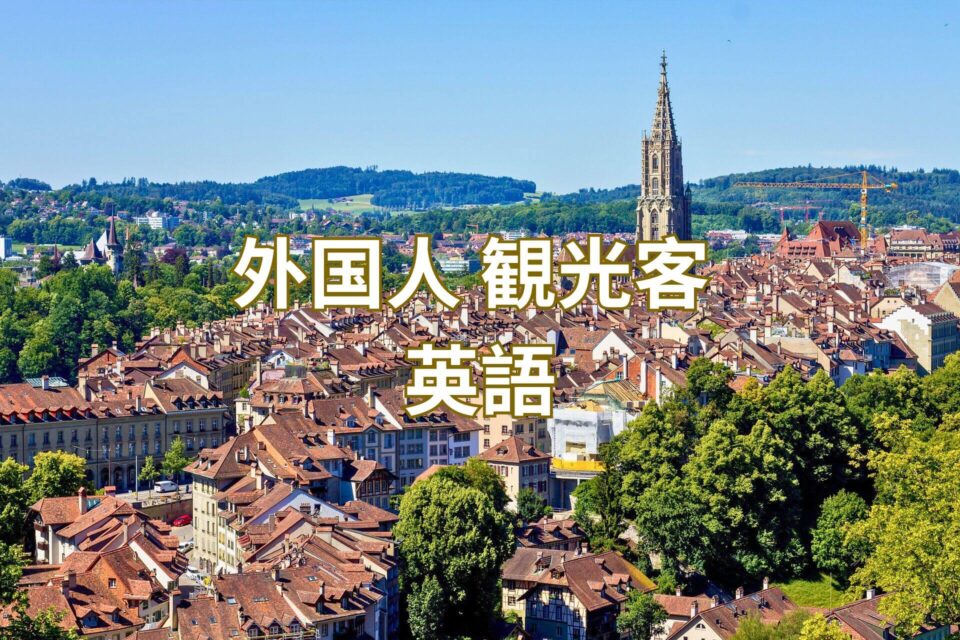外国人 観光客 英語表現7選! 例文 会話例 誤用例 記憶のフックで学びましょう!
外国人 観光客が急増中なので、国内のいたるところで外国人を目撃する機会が増えたと実感する方も多いでしょう。突然英語で話しかけられたり、お店にやってきてビックリした方もいるのではないでしょうか?
今回は「外国人 観光客 英語表現」についてお伝えしたいと思います。
外国人 観光客 英語では?
外国人 観光客 英語表現
| 英語表現 | ニュアンス・特徴 | 文脈での使いやすさ | フォーマル度 |
|---|---|---|---|
| foreign tourist | 最も一般的。「外国から来た観光客」という意味。 | 観光記事、ニュース、ガイドブックなど | 高 |
| international tourist | 「国際的に旅行している観光客」。やや堅め。 | 政策・経済・統計・観光業関連 | 高 |
| overseas visitor | 「海外からの訪問者」。観光客以外も含む場合あり。 | 観光、博物館、美術館、施設案内 | 中〜高 |
| non-local tourist | 「地元以外の観光客」。外国人だけでなく国内旅行者も含む場合あり。 | 地域イベント、ローカルニュース | 中 |
| visiting tourist | 「訪れている観光客」。口語的で親しみやすい。 | 観光案内、カジュアルな文章 | 低〜中 |
| foreign visitor | 「外国から来た訪問者」。観光以外も含む。 | 一般的な観光案内、公共施設、旅行ガイド | 中 |
| tourist from abroad | 直訳的。「海外から来た観光客」。口語でも可。 | 観光記事、旅行ブログ、口語表現 | 低〜中 |
外国人 観光客 英語例文
1. foreign tourist
最も一般的でフォーマルな表現。「外国から来た観光客」という意味。
例文:
Foreign tourists often visit Kyoto to see its temples.
外国人観光客はよく京都の寺院を見るために訪れます。
The city offers special discounts for foreign tourists.
その都市では外国人観光客向けの特別割引があります。
Local guides are trained to assist foreign tourists.
地元のガイドは外国人観光客を案内するために訓練されています。
2. international tourist
「国際的に旅行している観光客」というニュアンス。少し堅め。
例文:
International tourists contribute significantly to the economy.
外国人観光客は経済に大きく貢献しています。
Many international tourists prefer all-inclusive packages.
多くの外国人観光客はオールインクルーシブのプランを好みます。
The hotel caters to international tourists by offering multilingual staff.
そのホテルは多言語スタッフを配置し、外国人観光客に対応しています。
3. overseas visitor
「海外から来た訪問者」というニュアンス。観光客以外の訪問者も含む場合があるが、観光文脈でもよく使われる。
例文:
Overseas visitors are fascinated by Japan’s cherry blossoms.
海外からの訪問者は日本の桜に魅了されます。
The museum welcomed thousands of overseas visitors last year.
その美術館は昨年、何千人もの海外からの訪問者を迎えました。
Special guides are available for overseas visitors.
海外からの訪問者向けに特別なガイドが用意されています。
4. non-local tourist
直訳すると「非地元の観光客」。地元以外の観光客を指す表現。外国人観光客を含むこともある。
例文:
Non-local tourists often ask for directions in busy streets.
地元以外の観光客は、繁華街でよく道を尋ねます。
The festival attracts both locals and non-local tourists.
その祭りは地元民と地元以外の観光客の両方を引きつけます。
Non-local tourists should follow the park’s rules.
地元以外の観光客は、公園のルールに従うべきです。
5. visiting tourist
「訪れている観光客」という意味。少し口語的。
例文:
Visiting tourists are encouraged to try local cuisine.
訪れている観光客には地元料理を試すことが推奨されます。
Visiting tourists often take guided tours to understand the city better.
訪れている観光客は、市内をよりよく理解するためにガイド付きツアーに参加することが多いです。
Hotels offer special services for visiting tourists during peak seasons.
ホテルでは、観光客向けにピークシーズン中の特別サービスを提供しています。
6. foreign visitor
「外国から来た訪問者」という意味。観光客に限らず使えるが、観光文脈で一般的。
例文:
Foreign visitors often buy souvenirs at local markets.
外国からの訪問者は、地元の市場でよくお土産を買います。
The city center is crowded with foreign visitors during holidays.
祝日には市中心部が外国からの訪問者で混雑します。
Foreign visitors need to carry their passports when traveling.
外国からの訪問者は旅行時にパスポートを持参する必要があります。
7.tourist from abroad
意味:外国から来た観光客、海外からの旅行者。
例文:
Many tourists from abroad visit Tokyo during the cherry blossom season.
→ 桜の季節には、多くの外国人観光客が東京を訪れます。
The city offers free maps and guides for tourists from abroad.
→ 市では、海外からの観光客向けに無料の地図やガイドを提供しています。
Local shops are preparing special souvenirs for tourists from abroad.
→ 地元の店は、外国人観光客向けの特別なお土産を準備しています。
外国人 観光客 英語会話例
1. foreign tourist
A: Did you notice how many foreign tourists were at the temple today?
B: Yes, it was really crowded. I think they all came to see the autumn leaves.
A: I even heard some of them asking for English-speaking guides.
B: It makes sense. Many foreign tourists prefer guided tours to understand the history better.
A: True. We should make sure our signs are clear for them too.
和訳:
A: 今日、寺に外国人観光客がどれだけいたか気づいた?
B: うん、本当に混んでたね。みんな紅葉を見に来たんだと思う。
A: 英語を話せるガイドを探している人もいたみたいだよ。
B: なるほどね。多くの外国人観光客は、歴史をもっとよく理解するためにガイドツアーを好むからね。
A: そうだね。案内板もわかりやすくしておかないと。
2. international tourist
A: The tourism board reported a huge increase in international tourists this year.
B: Really? Which countries are sending the most visitors?
A: Mainly from the U.S., China, and Australia. They often come for cultural experiences.
B: That explains why the hotels are fully booked months in advance.
A: Exactly. International tourists are definitely boosting the local economy.
和訳:
A: 観光局が、今年は国際的な観光客が大幅に増えたと報告してたよ。
B: 本当?どの国からの訪問者が多いの?
A: 主にアメリカ、中国、オーストラリアだね。文化体験を目的に来ることが多いらしい。
B: だからホテルが数か月前から満室なんだね。
A: そうそう。国際的な観光客は確実に地元経済を押し上げてるね。
3. overseas visitor
A: We need to prepare a brochure for overseas visitors.
B: Yes, something that explains public transportation and local customs.
A: I think including maps and photos will help overseas visitors a lot.
B: Good idea. They often get confused without clear directions.
A: Also, maybe a section about etiquette in restaurants and temples.
和訳:
A: 海外からの訪問者向けのパンフレットを準備する必要があるね。
B: うん、公共交通や地元の習慣を説明する内容がいいね。
A: 地図や写真を入れると、海外からの訪問者にはとても助かると思う。
B: いいアイデアだね。明確な案内がないと迷いやすいから。
A: あと、レストランや寺院でのマナーについての章も入れた方がいいかもね。
4. non-local tourist
A: Non-local tourists often ask for the best local food spots.
B: Right, they want authentic experiences.
A: Last week, a group of non-local tourists asked me where to try traditional sweets.
B: Did you recommend anywhere?
A: Yes, a small shop near the station. They loved it.
和訳:
A: 地元以外の観光客は、よく地元のおすすめの食べ物スポットを尋ねるね。
B: そうだね、本物の体験を求めてるからね。
A: 先週、地元以外の観光客のグループが、伝統的な和菓子をどこで食べられるか聞いてきたよ。
B: どこかおすすめしたの?
A: うん、駅の近くの小さなお店だよ。みんな喜んでた。
5. visiting tourist
A: Visiting tourists really enjoyed the city tour yesterday.
B: I noticed that! They were taking pictures everywhere.
A: Some of the visiting tourists even asked if they could try local crafts.
B: That’s great. Interactive experiences make visiting tourists remember the city.
A: Definitely. We should plan more activities for them.
和訳:
A: 昨日の市内観光ツアー、訪れている観光客は本当に楽しんでいたね。
B: そうだね!どこでも写真を撮ってたよ。
A: 一部の観光客は、地元の工芸品を体験できるかも聞いてたね。
B: いいね。体験型のアクティビティは、観光客に街を記憶させるからね。
A: うん、もっといろんな活動を計画したほうがいいね。
6. foreign visitor
A: We need to provide better information for foreign visitors at the airport.
B: Absolutely. They often struggle to find transportation.
A: Maybe we could have multilingual signs and staff at key points.
B: That would make foreign visitors feel more welcome.
A: And perhaps a short guidebook with essential phrases in Japanese.
和訳:
A: 空港で外国からの訪問者向けに、もっと情報を提供する必要があるね。
B: その通り。交通手段を探すのに困っていることが多いからね。
A: 主要な場所に多言語の案内板とスタッフを配置するといいかも。
B: そうすれば、外国からの訪問者ももっと歓迎されていると感じるね。
A: あと、日本語の基本フレーズをまとめた短いガイドブックもいいかも。
7. tourist from abroad
A: Tourists from abroad are really interested in traditional festivals.
B: Yes, they seem fascinated by the costumes and rituals.
A: I spoke to a tourist from abroad who wanted to participate in a tea ceremony.
B: That’s wonderful. Tourists from abroad often seek authentic cultural experiences.
A: Exactly. We should make these experiences more accessible.
和訳:
A: 海外からの観光客は伝統的なお祭りに本当に興味があるね。
B: うん、衣装や儀式にすごく魅了されているみたいだね。
A: 海外からの観光客で、茶道に参加したいと言っていた人と話したよ。
B: すばらしいね。海外からの観光客は本物の文化体験を求めることが多いから。
A: そうそう。こうした体験をもっとアクセスしやすくするべきだね。
外国人 観光客 誤用例・注意点

1. foreign tourist
誤用例: “Foreign tourists are coming from nearby towns.”
問題: 「foreign」は「外国から来た」という意味なので、国内旅行者には使えません。
注意点: 国内旅行者には domestic tourist を使う。
2. international tourist
誤用例: “We welcomed international tourists from the same country.”
問題: 「international」は「国際的」「複数国に関わる」という意味なので、単一国からの観光客には不自然。
注意点: 単一国の観光客には foreign tourist を使う方が自然。
3. overseas visitor
誤用例: “Overseas visitors attended the local neighborhood party.”
問題: 「overseas visitor」は通常、観光・ビジター向けのフォーマル文脈で使われるため、近所の小規模な行事には不自然。
注意点: 規模が小さい・日常的な場面には guest from abroad などを使う方が自然。
4. non-local tourist
誤用例: “Non-local tourists need visas to enter Japan.”
問題: 「non-local tourist」は地元以外の観光客全般を指すため、外国人だけを意味するわけではない。ビザの話には不適切。
注意点: ビザや国籍に関する話題では foreign tourist / international tourist を使用。
5. visiting tourist
誤用例: “Visiting tourists live here permanently.”
問題: 「visiting tourist」は短期滞在の観光客を指すので、居住者には使えません。
注意点: 永住者や長期滞在者には resident / expat を使う。
6. foreign visitor
誤用例: “Foreign visitors come from neighboring towns.”
問題: 「foreign」は「外国からの」という意味なので、国内旅行者には使えません。
注意点: 国内旅行者には domestic visitor を使用。
7. tourist from abroad
誤用例: “All tourists from abroad must speak English.”
問題: 「tourist from abroad」は国籍を問わない観光客全般を指すが、「必ず英語を話す」というのは誤解を招く。
注意点: 言語や文化の前提条件を断定するのは避ける。
外国人 観光客 記憶のフック
1. foreign tourist
TIPS: 「foreign = 外国の」と覚える。フォーマルでニュースやガイドブックに出やすい。
文化的背景: 日本では京都・奈良・東京など、歴史的・観光地に多く見られる典型的な「外国からの観光客」。
記憶フック: 外国の旗を持って観光しているイメージ。ニュース記事に出る「外国人観光客○○万人」と結びつける。
2. international tourist
TIPS: 「international = 国際的」を意識。複数国をまたぐ観光客のイメージ。
文化的背景: 国際観光統計や観光政策でよく使われる表現。政府や観光局の発表に登場。
記憶フック: 世界地図を見ながら「アメリカから、中国から、オーストラリアから…」と複数国を指すイメージ。
3. overseas visitor
TIPS: 「overseas = 海を越えた」というイメージ。観光施設や空港での案内に多い。
文化的背景: 博物館・美術館・観光施設がパンフレットやサイトで使うことが多い。
記憶フック: 飛行機で海外からやってくる人が「visitor」カードを持って入場するイメージ。
4. non-local tourist
TIPS: 「non-local = 地元でない人」と覚える。国内・国外問わず、地元以外の観光客全般に使える。
文化的背景: 地方の観光地や地域イベントで使われやすい。地元の人と観光客の区別を意識した表現。
記憶フック: 地元の人と別行動している観光客たちのイメージ。祭りやローカル市場で迷っている人。
5. visiting tourist
TIPS: 「visiting = 訪れている」を意識。短期滞在者というニュアンスを持つ。
文化的背景: ガイドブックや観光案内で親しみやすく使われる。
記憶フック: 日帰りや1泊程度で街を見て回る観光客を想像。「旅行者が訪れる=visiting」。
6. foreign visitor
TIPS: 「visitor = 訪問者」に「foreign」をつけるだけ。観光客以外も含むが、観光文脈では自然。
文化的背景: 空港・公共施設・観光案内のフォーマル表現で多用。
記憶フック: 空港や観光案内所で「foreign visitor counter」があるイメージ。
7. tourist from abroad
TIPS: 「from abroad = 海外から」を意識。口語的で説明的。
文化的背景: 旅行ブログやツアー紹介で多く見られる表現。
記憶フック: 「海外からやってきた観光客」とそのままイメージしやすい。旅行者のスーツケースやガイドブックと結びつける。
tourist visitor traveler の違いは?
1. tourist
意味・ニュアンス:観光目的で訪れる人。旅行先で観光地や名所を楽しむことが中心。
特徴:
観光・休暇・レジャー目的
計画的・パッケージ旅行に多い
「観光客」という日本語に最も近い
例文:
Many tourists visit Kyoto every year.
→ 毎年多くの観光客が京都を訪れます。
She went to Paris as a tourist.
→ 彼女は観光客としてパリに行きました。
2. visitor
意味・ニュアンス:ある場所や施設を訪れる人。観光に限らず、仕事や用事で訪れる場合も含む。
特徴:
より一般的で広い意味
観光以外(オフィス、学校、美術館など)でも使える
例文:
The museum has 500 visitors every day.
→ その美術館には毎日500人の来館者がいます。
We have a visitor from the Tokyo office.
→ 東京オフィスから来た訪問者がいます。
⚠️ 注意点:「visitor」は観光目的とは限らないので、観光客を指す場合は「tourist」の方が自然。
3. traveler(トラベラー)
意味・ニュアンス:旅をする人全般。長期旅行者やバックパッカーのような自由な旅人を指すことも多い。
特徴:
「旅をする人」という広い意味
観光だけでなく移動や冒険を楽しむニュアンス
「tourist」と比べると、計画に縛られず地元の文化や生活に溶け込むことを重視するイメージ
例文:
He is a world traveler who has visited 50 countries.
→ 彼は50カ国を訪れた世界旅行者です。
Travelers often prefer small guesthouses over big hotels.
→ 旅行者は大きなホテルより小さなゲストハウスを好むことが多い。
⚠️ 注意点:「traveler」は観光だけではなく、移動や体験を楽しむ旅人全般を指す。
| 単語 | 主なニュアンス | 用途例 | 観光目的か |
|---|---|---|---|
| tourist | 観光・休暇・レジャー | 名所観光、パッケージ旅行 | ○ |
| visitor | 訪問者・来館者・訪問目的は不特定 | 美術館、学校、オフィス訪問 | △(観光含むが限定されない) |
| traveler | 自由な旅人・冒険・体験重視 | 世界旅行者、バックパッカー | △(観光も含むが主体ではない) |



コメント